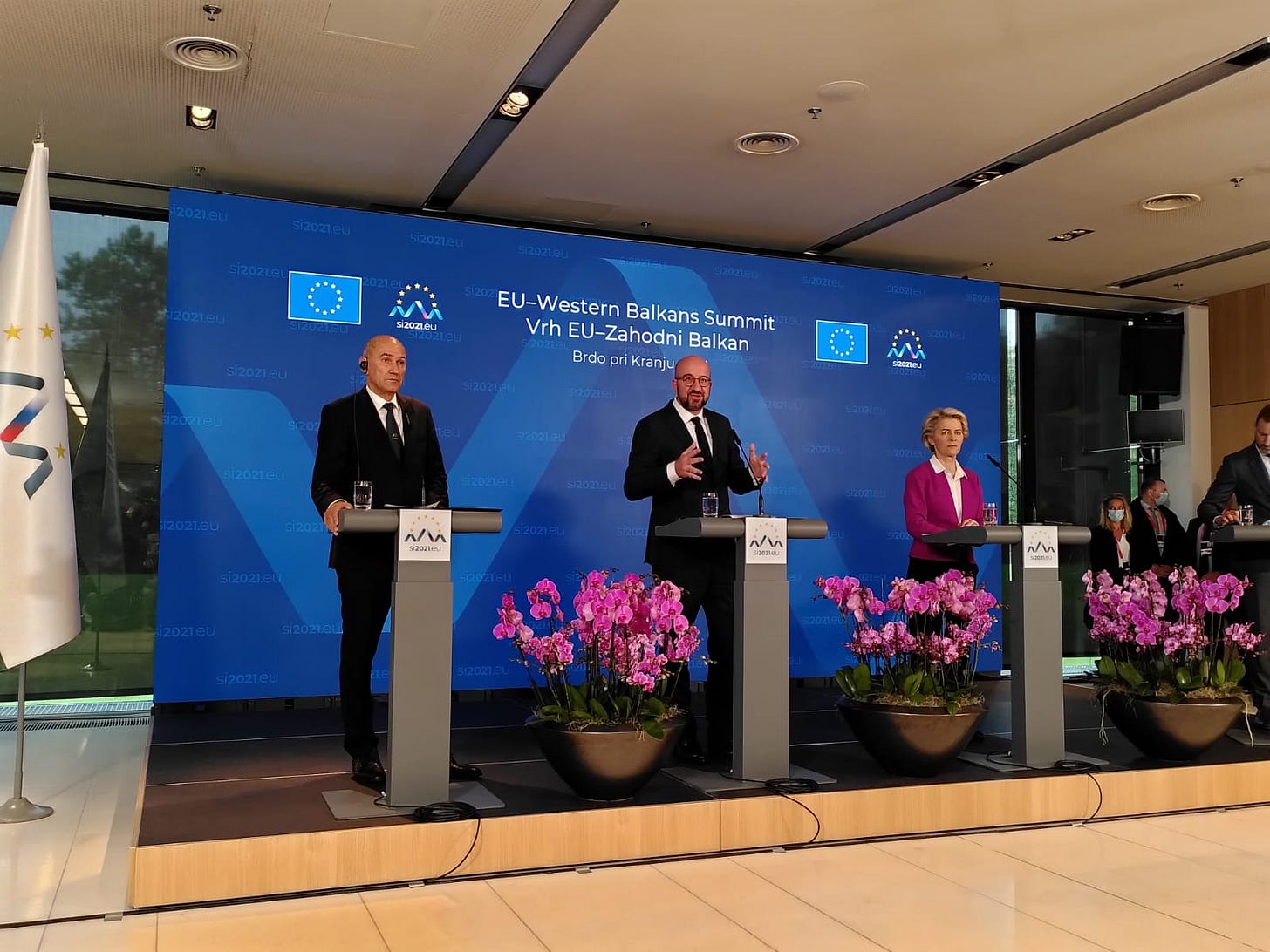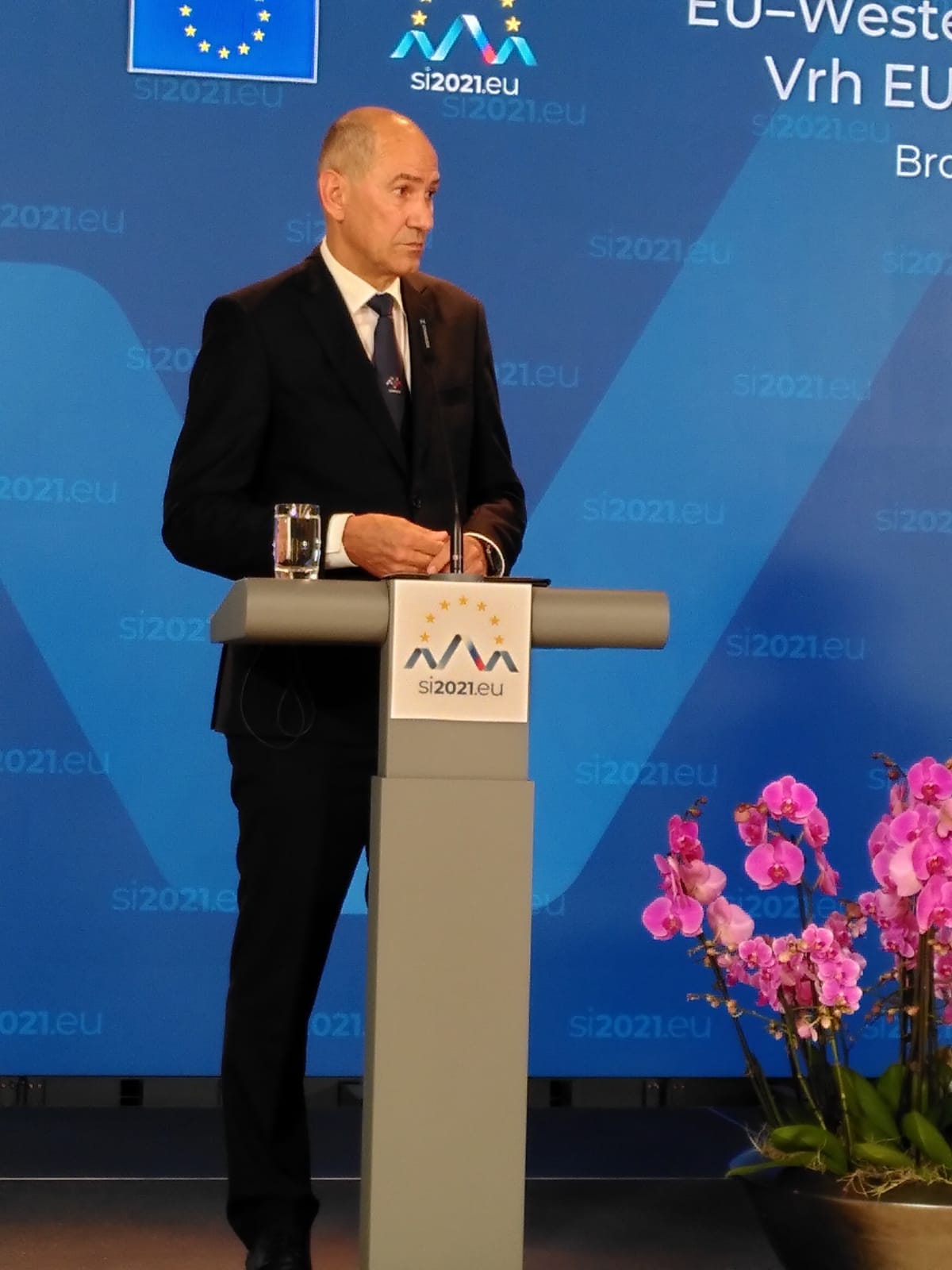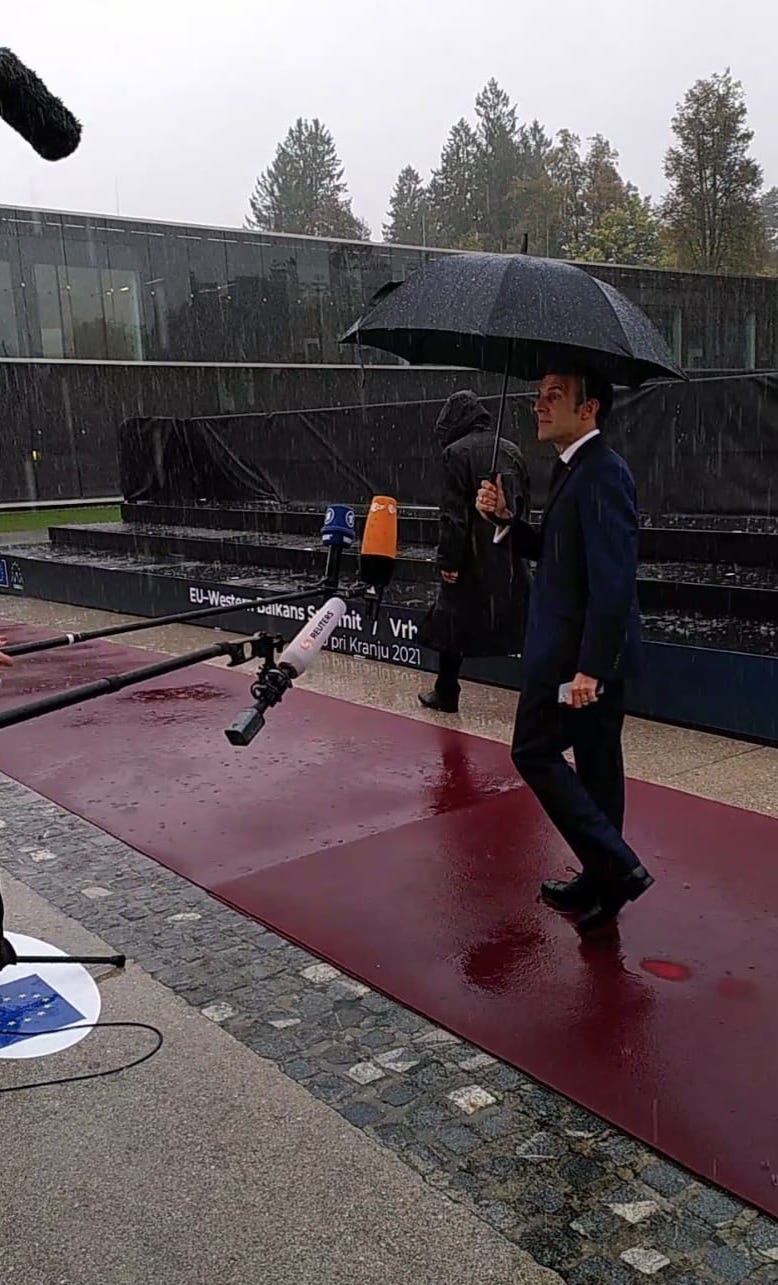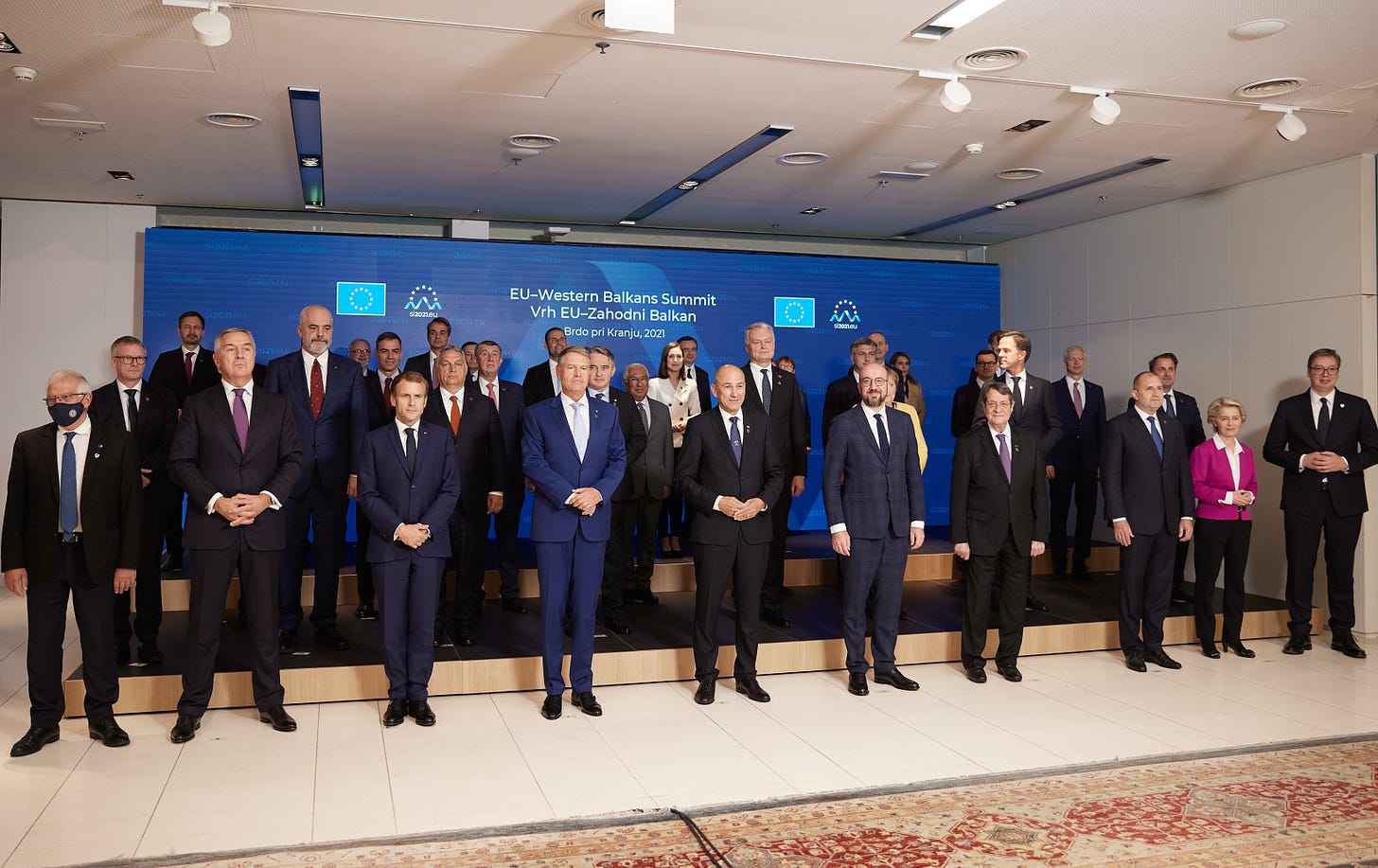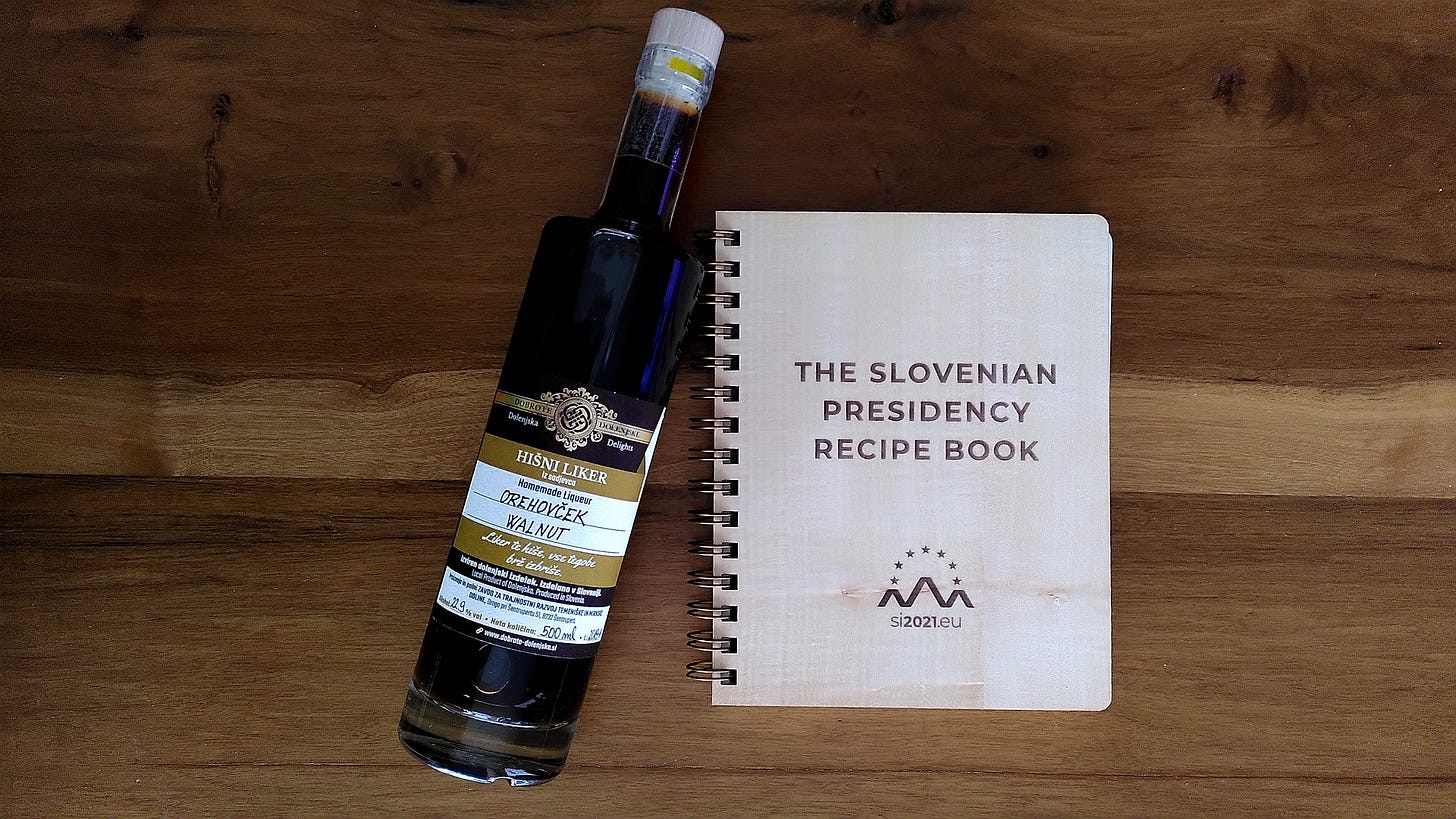S2E9. It should be better, it could be worse
Back from the EU-Western Balkans Summit, a behind-the-scenes analysis of the flop (not the failure) of the most important event for the prospects of the EU enlargement in the region
Hi,
welcome back to BarBalkans, the newsletter with blurred boundaries.
I want to open this newsletter with the same words I told Lorenzo Robustelli, editor of Eunews, at the end of the hard work’s day in Kranj, following the EU-Western Balkans Summit.
Thank you so much for letting me go, it was so incredible!
You already know that I was able to attend the most important political event for the relationship between the European Union and the six Balkan countries, thanks to the support of BarBalkans’ subscribers and of Eunews editorial staff.
We talked about it in last Saturday’s newsletter, that you can read again if you need some background.
Today, I want to tell you what happened on Wednesday, from a very personal perspective.
It was a flop
The higher your expectations, the harder you’ll fall.
This is the case of the summit in Kranj.
Considering that it should have been the keystone for the enlargement of the EU in the region, at the end it turned out to be nothing more than a container of things that have already been said. Criticism is inevitable.
This is why it was a flop, but not a failure. It should be better, but it could be worse.
Let me explain.
To be considered a success, the summit had to emerge three conclusions:
A clear indication on the opening of accession frameworks with Albania and North Macedonia;
An indicative date for the final completion of the enlargement process in the Balkans;
A clear stance of all 27 Member States on the irreversible commitment to this process.
In case you were wondering, none of the three conclusions eventually found space in the Brdo Declaration (Brdo is the name of the location, near the town of Kranj, that names the castle and the congress centre were the summit took place).
The word enlargement is in bold. And it speaks for itself.
For example, it tells us that this was the only achievement of the Slovenian Prime Minister and President of the Council of the European Union, Janez Janša.
EU Council sources confirmed that he wanted at all costs to include 2030 as the deadline for completing the enlargement process of the EU in the Western Balkans.
The summit in Slovenia was meant to be the highlight of his six-month Presidency of the Council of the EU.
However, across the table there was a number of Member States that even wanted to delete the word “enlargement” and replace it with the less challenging expression “European perspective”.
It sounds like a harmless play on words, but at a diplomatic level it weighs a million pounds. That would have been a failure.
We shall come back to this later.
Janša certainly is one of the losers of this summit, but at least he managed to make up for it at the last minute.
The biggest loser in Kranj is the President of the European Commission, Ursula von der Leyen.
During the press conference she hardly even cracked a smile, something she is usually very good at.
The two-and-a-half-hour summit was not the best experience for President von der Leyen. I did not have confirmation of this from EU Commission sources, but it was pretty easy to understand from her body language.
Also because the week before she promised Skopje and Tirana that the opening of accession frameworks for North Macedonia and Albania will happen by the end of 2021.
This is of course the position of the EU Commission: «I fully understand your frustration», she addressed Balkan citizens.
But we have to admit that it was a risky promise. It is hard to see how in just three months Bulgaria’s veto on North Macedonia starting accession (that is blocking also Albania’s way towards EU accession) could be lifted.
All the more so if we take into account the political situation in the two main EU Member States.
Germany - responsible in all these years for the integration of the Western Balkans through the Berlin Process - is in the midst of forming the first post-Merkel government. Let us say that it has other things to think about.
France - never so enthusiastic about opening the EU to new members - is waiting for the 2022 presidential elections. It would be foolish to expect a sudden change of course.
Concerning the casus belli - Bulgaria’s veto - there has been no sign of openness recently. This is a fact and the perfect excuse for those who cannot or do not want to push the enlargement process of the EU.
With the other journalists in Kranj, we imagined President von der Leyen getting to Brdo table and asking for the deadline of December 31, 2021. And the European leaders answering: «No, thanks». End of the speech.
Even the outgoing German Chancellor, Angela Merkel, mentor of the President of the EU Commission (German herself), pointed out to the press that «time perspectives are not a good idea».
Now her resigned expression is explained, isn’t it?
It was not a failure
Wednesday’s was a flop, but not a failure.
This point of view can give us more lucidity to analyze the prospects of European integration for the region.
First of all, who is the Grand Puppetmaster behind this lack of progress?
A bloc of countries headed by Paris.
This is nothing new. In 2018/19, France - along with the Netherlands and Denmark - vetoed for three times on Albania starting accession (in that case, blocking North Macedonia’s way towards EU accession).
At the same time, talking to some diplomatic sources at the summit, I got the impression that we are facing a new phase for French power.
Regardless of which government is in office, the State apparatus has a strategy thinking that covers at least a decade.
Paris knows perfectly that - if the EU opens to the six Balkan countries now - in 2030 there will be a bloc of new Member States that in the EU Council will be aligned with Germany and Italy, the main economic and diplomatic investors in the region.
Without considering the implications in terms of redistribution of the budget for territorial cohesion policy, the French risk crippling themselves. This is why they have never been too in favor of further enlarging the EU.
But, at the same time, France is trying to carve out the role of the top of the class among the 27 member States (also thanks to Germany’s moment of physiological adjustment). It is time for Emmanuel Macron, and whoever will be the next President, to decide what France will have to do in the future.
The time of “Let’s wait for the reforms in the Balkans” and “The problem is Bulgaria’s veto” is coming to an end. We expect determination from the only EU Member State with a permanent seat in the UN Security Council: whether yes or no.
An assumption of responsibility, through the language of diplomacy, whatever the choice implies.
Opening discussions on overcoming the veto system in the EU Council, in the best case scenario. Or leaving the region at the mercy of the political and economic interests of Russia and China, in the worst case.
In short, this flop can put Paris up against a wall: a disengagement in the style of “European perspective” would have been much easier.
We can start from here.
And then we have consider Italy, which has a lot to say on this issue.
Several sources confirmed it and they have all revealed a certain irritation in the French attitude, within the limits of diplomacy and the awareness that in the European Union each Member State plays its own game.
Considering Italy’s consolidated relationship with all the countries of the region, but in particular with Albania, what is its position?
First of all, Rome has never stopped pushing for the enlargement process of the EU in the Western Balkans and is still one of the Member States that weighs the most.
However, the key concept is the respect of the required conditions and procedures.
The case of the Albania+North Macedonia enlargement package is emblematic.
We can legitimately ask why Tirana should be «hostage» (quoting the Albanian Prime Minister, Edi Rama) to a veto that does not pertain Albania, if all the European requests have already been satisfied.
In short, why not disjointing Albania’s and North Macedonia’s EU path, letting Tirana start immediately and Skopje whenever it will be possible?
Whether we like it or not, it is «a question of coherence», as one of the most reliable source I met in Kranj told me.
As we have seen before, until the EU Council of March 2020 the problem was the other way around: North Macedonia was ready to start, but it was hostage to the Franco-Danish-Dutch veto on Albania.
Italy then decided that it was a priority to send a clear message to the region: we move forward together and Brussels’ promises can be trusted. Leaving someone behind could have caused frustration and a wave of anti-EU protests.
A year and a half later, and with the situation reversed, Italy wants its partners to be able to rely on a «serious» stance.
In other words, not to break its previous words after a short time. At this level, the policy logic are completely different from those we are commonly used to.
However, with the frustration that is beginning to grow in both countries, we have think whether this is not the most positive approach anymore. Whether we are not risking getting stuck in this belief.
Another starting point offered by the non-failure of the summit in Kranj.
It should be better
In conclusion, in all this European turmoil, how do the Balkan partners feel about it?
I am convinced that the comment of a Macedonian journalist who shared with me the bus ride back to Ljubljana at the end of the day is enough:
«I am disappointed».
Disappointed. Not angry, nor frustrated, nor demoralised. Disappointed.
Disappointed with the incapacity of the European countries to put order inside the EU, before making promises outside. And to keep those promises, once all the requests have been satisfied.
Disappointed with the decision to keep six countries pending for no apparent reason.
And if you think about it, after years of Brexit controversy, there are millions of citizens who really want to join the EU: it could and should be our new beginning.
«We waited 27 years to join NATO, because of Greece’s veto. It’s been 16 years since we received the EU candidate status, and Bulgaria’s veto seems like a movie I’ve already seen before», Tamara tells me.
Like the vast majority of her compatriots, she is disappointed and does not know how long Macedonian trust in Brussels will last.
She can only confirm that «we are used to waiting and being patient», but also that this time there is a risk that Russians and Chinese will be more convincing: «They come with money, not with political promises, and in the long run someone will fall for it».
Before saying goodbye, my Macedonian colleague makes one last, bitter joke: «You see, my generation witnessed our accession to NATO. Probably, the next generation will see North Macedonia joining the European Union!»
The last food for thought should be for policymakers at the EU political level.
After all, we are talking about European citizens, who «share our same destiny», as President von der Leyen stressed out.
At the next EU-Western Balkans Summit - to be held in 2022 in the Czech Republic, according to the latest rumors - these people will deserve a little more consideration.
Pit stop. Sittin’ at the BarBalkans
We have reached the end of this piece of road.
Believe it or not, the Slovenian Presidency of the Council of the EU brought a gift to our bar, the BarBalkans.
As part of the welcome package to the EU-Western Balkans Summit, we received The Slovenian Presidency Recipe Book. Now we can reproduce plum soups, matevž (beans and potatoes) with ribs, štruklji (cheese rolls) and the Slovenian “national ambassador”: potica, the typical dessert.
But I also promised you that this time I would recommend something from a Balkan bar.
So here is a homemade walnut schnapps, that I have brought directly from Ljubljana.
Schnapps is Slovenia’s national drink, a close relative of rakija. The variant I am recommending today is a fruit distillate.
In order to produce schnapps, you have to ferment smashed fruit in barrels (the fruit sugars will turn into alcohol) and then boil the must.
As in all distillation processes, steam must be captured in a still, to purify and liquefy it.
The first distillate must be thrown away, because it is poisonous alcohol. The second distillation process gives the final product, with an alcohol content between 20 and 40%.
Na zdravje!
Let’s continue the BarBalkans journey. We will meet again in a week, for the 10th stop.
A big hug and have a good journey!
Just back from Slovenia, I am already looking forward to leave for new places and tell you new events from there.
If you want to support this project, you can subscribe:
And thank you, whatever you decide!
In case you have decided to support the project, every second Wednesday of the month you will receive a podcast with an article about the dissolution of Yugoslavia.
You can listen to the preview of BarBalkans - Podcast on Spreaker and Spotify. Don’t miss the next episode on Wednesday!
As always, I thank you for getting this far with me. Here you can find all the previous newsletters.


